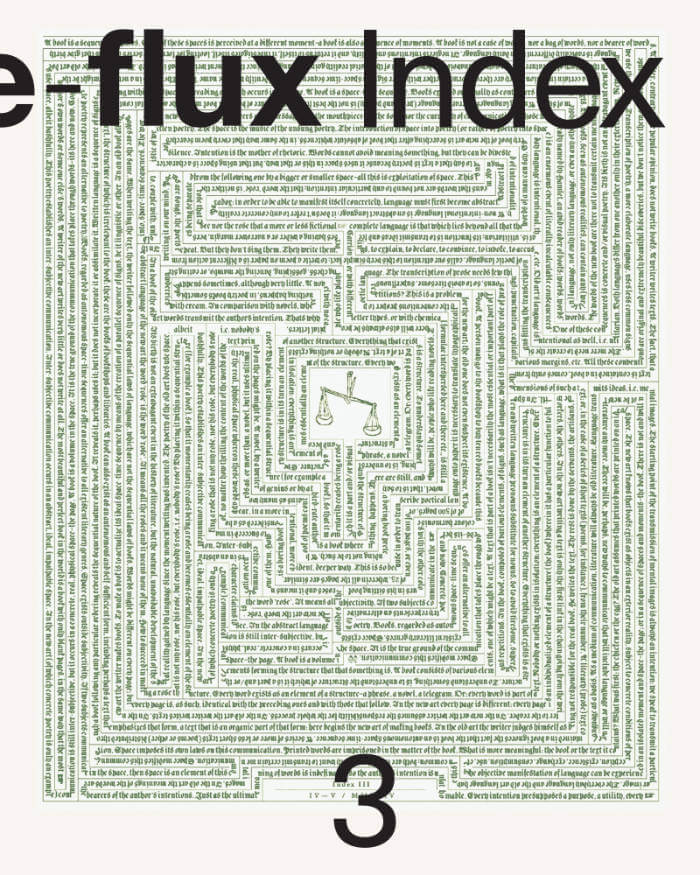
e-flux Index #03
George MacBeth ed.
76 contributions from an international selection of critics, artists, poets, architects, filmmakers, and theorists, published by e-flux between April–May 2024, arranged into 11 thematic chapters—ranging from the live question of cultural censorship through to the role of diagrams and notation in contemporary artistic practice.
540 pages long, this volume includes contributions from authors, artists, architects, filmmakers, poets, and theorists from many parts of the world. Ulises Carrión once declared that "In the new art every book requires a different reading"—an attitude which the Index here adopts in its approach to contemporary culture.
Contributions by Kwabena Appeaning Addo, Kimberly Alidio, Shouka Alizadeh, Corina L. Apostol, Aram, Arnavaz, Andrius Arutiunian, Robert Ashley, Goli Baharan, Stephanie Bailey, Oliver Basciano, Merve Bedir, Silvia Benedito, Pietro Bianchi, Alessandro Bosetti, Arno Brandlhuber, Nathan Brown, Boris Buden, Harry Burke, Rocio Calzado, Matevž Čelik, Adeline Chia, Ted Chiang, Canada Choate, Jace Clayton, Kim Cordóva, Ana Dana Beroš, Dasgoharan, Miri Davidson, Nuzhan Didartalab, Travis Diehl, Brian Dillon, Maria Dimitrova, Ben Eastham, Ren Ebel, Elaheh, Ludwig Engel, Future Foodscapes Research Unit, Ghoncheh Ghavami, Olaf Grawert, Boris Groys, Maddie Hampton, Negar Hatami, Jörg Heiser, Sandi Hilal, Daisy Hildyard, Juan José Santos, Nicole Kalms, Biljana Kašić, Tamta Khalvashi, Alina Kolar, Mo Michelsen Stochholm Krag, Cat Kron, Agnieszka Kurant, Michał Libera, R.H. Lossin, Rômulo Moraes, Daniel Muzyczuk, Nahal Nikan, Tausif Noor, Bahar Noorizadeh, Alice Notley, Joe Osae-Addo, Parva, Octave Perrault, Alessandro Petti, Andreas Petrossiants, Filipa Ramos, Jacques Rancière, Robida, Aoife Rosenmeyer, Mika Savela, Debora Silverman, Daniel Spaulding, Jonas Staal, Kerstin Stakemeier, Ben Vida, Anthony Vidler, McKenzie Wark, Katrina Wiberg, Kaelen Wilson-Goldie, Jenny Wu, Osman Can Yerebakan, Vivian Ziherl.
Language: English







